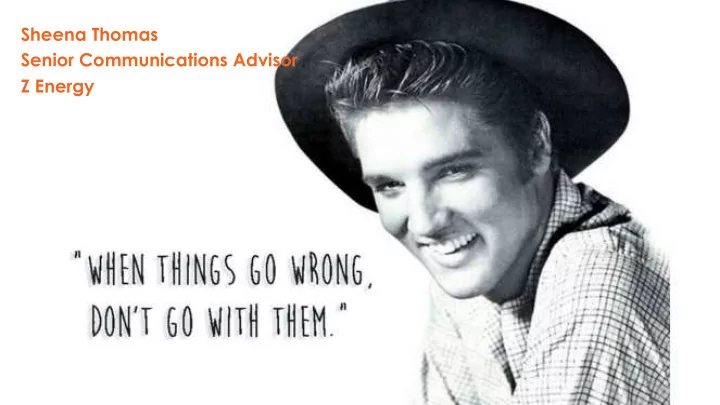

Sheena Thomas Senior Communications Advisor Z Energy
What we’ll cover 1. Why reputation is important 2. Building a strong foundation 3. Managing risk and being prepared 4. Managing negative PR 5. Managing a reputational crisis
How’s your foundation? Is your organisation built on rock or sand?
What are your values? Use them
Manage your risks How to identify issues before they go wrong publicly • Empower staff and volunteers to raise issues • Look for “weak signals”. Pay attention to the niggling voice • Seek feedback regularly, from customers, from staff, volunteers, stakeholders, funders • Monitor what people are saying (i.e. media, social media particularly relevant), i.e. media monitoring, google alerts (free) • Avoid group think • Keep a risk register and make it part of your governance framework
Reputation risk register [EXAMPLE] High Potential impact on reputation Potential Risk INCREASING STABLE Re-use of Medium supermarket Neighbour issues with docket codes at DECLINING rebuild works Pay at Pump Market New NEW / REFRESHED RISK rumours Political /social issues Relative levels of management intervention Low H H High M 15% or less Between 15 and 50% 50% or higher Likelihood of reputational impact L M H L L M Potential Impact Assessment. High: Potential for regulatory intervention, criticism by Ministers, customer boycott, sustained negative national media coverage, enduring damage to brand / reputation Medium: Some negative national media coverage, public criticism by key stakeholders, customer complaints on site Low : Regional criticism, local media coverage over a short period of time, negative story mitigated by positive developments
Be prepared Some practical things to think about: • Do you have a media policy and social media policy? • Who are your spokespeople and have they had media training? • Do the rest of your staff and volunteers know what’s expected of them if contacted by the media?
When things do go wrong
Let your values guide you • Try to deal with it before it becomes a PR situation • Deal with everything in a way that aligns with your values • Being seen to be true to your values gives you the best chance of coming out stronger at the other end
Be clear and consistent • What do you want to leave your audience thinking / feeling? • What are the facts? • What are the key messages that will directly support how you want to leave your audience thinking / feeling? • Take the time to gather your facts and your thoughts
Be straight up • People will tolerate an honest mistake but they won’t tolerate lies • Don’t be afraid to say sorry • If something’s wrong, fess up early
A recent example: Z’s Vegan Pie
Crisis Management When is it considered a crisis? Ultimately, we are managing a crisis when our license to operate is at risk – Z Energy Crisis Plan
Crisis Management Some practical advice • Have a crisis plan that aligns with your values • Who needs to know? (i.e. stakeholders. Board, funders, staff ) • Bear in mind the 3 C’s Concern (or compassion – be human) Control (you are aware of the situation and have things under control or are taking steps) Competence (you know what you’re talking about, confident, without being defensive) And a fourth – Consistency (key messages are consistent, your “label” for the situation is consistent etc). • Don’t lie or try to avoid the truth!
Crisis Plan Your crisis plan should cover: • A reminder of your values • Who you need to involve • Who you need to inform • Who will deal with media, social media and stakeholders (incl internal) • Who your spokespeople are • Who will make decisions and who needs to be involved • How you will ensure consistency • Important contact details
Go forth and conquer Remember the following and your organisation will be all set to “stand firm” when things go wrong • Values – have them, use them FOR EVERYTHING • Keep an eye on your risks – actively solicit feedback, monitor what people are saying, look for weak signals, include reputational risk in your board / governance processes • Be prepared for things going wrong – identify and train spokespeople, have a media policy, have a crisis plan • Don’t forget your most important audience (staff, volunteers and stakeholders) • Never, ever lie
Let’s chat Questions? Comments or anything to add? Examples you want to share? A problem you’d like to unpick?
Volkswagen and saying “sorry” John Oliver sums it up perfectly https://youtu.be/Cdif-zK4z14
Recommend
More recommend